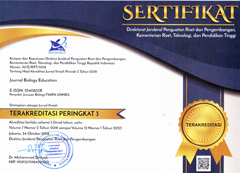The Effect of Reciprocal Teaching on Cognitive Learning Outcomes and Learning Interests of Learners on the Theme of Environmental Change and Preservation
Abstract
The Covid 19 pandemic has reduced student learning outcomes. The decrease in learning outcomes is directly proportional to the decrease in learning interest. The reciprocal teaching model supports students to play an active role in learning with the teacher as a facilitator. The purpose of this study was to analyze the effect of the reciprocal teaching model on cognitive learning outcomes and students' interest in learning about environmental change and preservation at MAN 1 Semarang. This type of research is quasi-experimental with a non-equivalent control design. The sample in the study was determined by purposive sampling technique with X MIPA 3 as the experimental class and X MIPA 4 as the control class. Data on students' cognitive learning outcomes were measured using a test instrument and learning interest was measured using a questionnaire instrument. The results showed that there was a significant difference in the average cognitive learning outcomes in the experimental class compared to the control class with an average learning outcome of 83.89 > 73.47. The average increase in learning outcomes in the experimental class and control class is in the same category, namely moderate and significantly different with an N-Gain value of 0.46 > 0.33. The classical completeness of the experimental class was 91.67% and that of the control class was 61.11%. The experimental class gave a response that greatly increased interest in learning with an average percentage of 87.48% and the control class gave a response that did not increase interest in learning with an average percentage of 65.88%. The conclusion of this study is that the reciprocal teaching model has an effect on cognitive learning outcomes and students' interest in learning at MAN 1 Semarang.
The copyright of the article once it is accepted for publication shall be assigned to the journal as the publisher. The intended copyright includes the right to publish the article in various forms (including reprints). The journal maintains the publishing rights to the published articles.
This work is licensed under a Creative Commons Attribution 4.0 International License.







